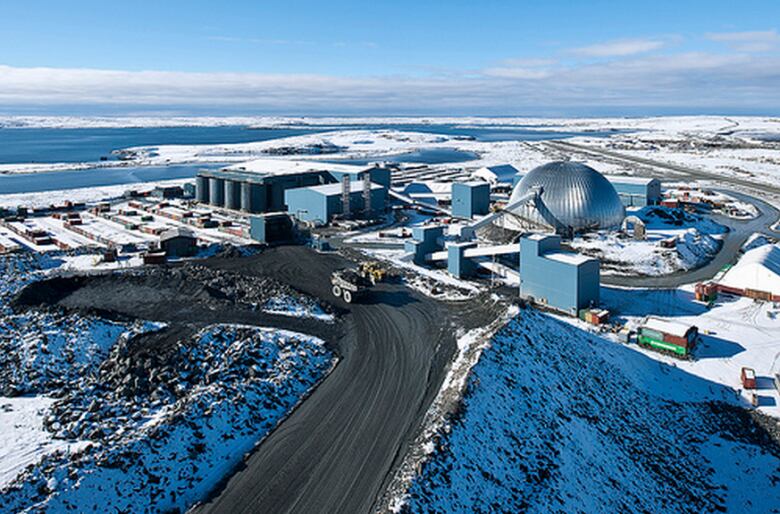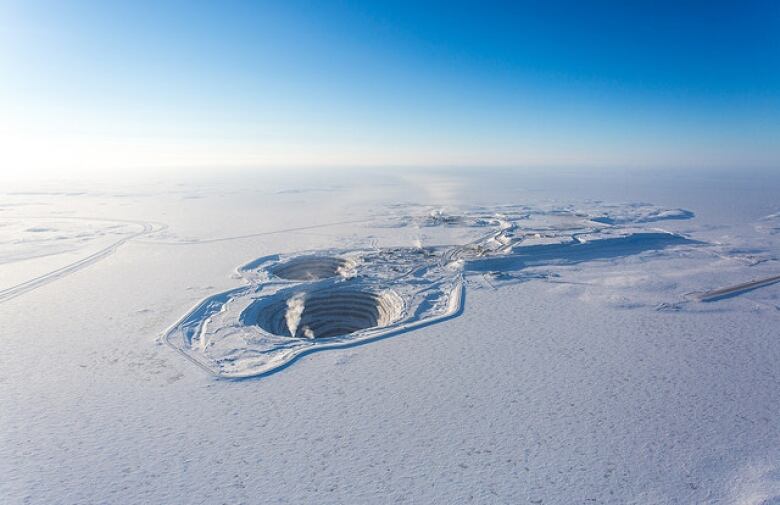Struggling mining industry can't access federal wage subsidy, advocates say
Requirements 'problematic' according to Nunavut, N.W.T., and Yukon chambers of mines

While last week's boost to the new Canadian Emergency Wage Subsidy (CEWS) was supposed to prop up struggling businesses and the workers they employ during the COVID-19 pandemic, it's doing nothing for the North's now stagnant mining industry, mining advocates say.
In a letter obtained by CBC to the Minister of Northern Affairs, the president of the NWT and Nunavut Chamber of Mines Ken Armstrong and the Yukon Chamber of Mines presidentEd Peart say the vast majority of companies they represent aren't eligible for the subsidy. They're calling on Ottawa to change requirements so that those in the northern mining industry, and their employees,can benefit.
Last Wednesday, Finance Minister Bill Morneau announced the federal government would offer a 75 per cent wage subsidy to all businesses that have lost 30 per cent of their revenue as a result of theCOVID-19 pandemic. The federal government had previously said it would only offer a 10 per cent subsidy.
To qualify, companies must show their revenue in March 2020 was 30 per cent less than it was in March 2019.

The problem, according to the mine chambers, is that revenue from many mining-based companies is uneven year over year. In many cases, companies work on projects for months and only receive payment at the end. Even revenues month to month are far from constant, they wrote.
"A comparison of revenue to the same period last year is not reasonable or reflective of their revenue losses in 2020," the letter states.
"We recommend that all companies with active mining operations in Yukon, Northwest Territories and Nunavut should qualify for CEWS regardless of 30 per cent revenue shortfall requirement."
The chambers say, in the North, the mining industry "is the largest private sector employer and contributor to the gross domestic product." They add that industry provides 10,000 jobs and produces $3 billion worth of minerals a year.
Mines drastically increase spending
The pandemic means mines operating across the North have had to drastically increase spending to accommodate federal and territorial health orders.
We can expect the reopening and repair of the territorial economies will be much slower than the South.- Letter sent to federal Minister of Northern Affairs Dan Vandal
Many mines, like Meliadine in Nunavut and Diavik and Ekatiin the N.W.T., have sent many of their northern workers back to their small communities with pay, to avoid potentially spreading COVID-19. Others have set up "quarantine camps" in case employees begin to display symptoms. The letter says some mines are even chartering flights from across the country to bring workers to site because domestic commercial flights have been greatly reduced.
Exploration companies in limbo
Companies doing exploration work have also been left out of theprogram. Until their projects come online and start production, the majority of exploration companies don't make any revenue and so demonstrating a year over year reduction is impossible, the chambers say.
They state that being able to keep employees on during the pandemic will mean exploration companies can maintain relationships with local Indigenous communities.
"There is tremendous value in these relationships, a value higher than would be recognized in the proposed emergency wage subsidy," the letter states.

The chambers are not the only industry advocates calling for an overhaul to the wage subsidy criteria.
Last week, the Canadian Federation of Independent Business (CFIB), a lobby group that represents small- and medium-sized businesses, said it supports the CEWS but it also has concerns about the 30 per cent revenue dip requirement.
The CFIB is asking Ottawa to eliminate the requirement for proof of a 30 per cent drop in revenue for all firms with fewer than 500 workers, and for those ordered to fully or partially shut down by provincial and territorial public health authorities.
Northern economy slower to recover: chambers
While economies in southern Canada are expected to rebound sometime in the summer, the northern economy heavily propped up by the mining industry will take much longer, the two chambers say.
Given the remoteness of the North's mining operations and the logistics associated with it, the northern mineral sector will take much to ramp back up.
"We can expect the reopening and repair of the territorial economies will be much slower than the South," the letter states.
"Therefore we urgently request the federal government take the unique circumstances of Canada's North into account and ensure the companies active in its most important and largest private sector industry are provided the supports they need to survive and retain employees during this unprecedented crisis."
No one from Northern Affairs MinisterDan Vandal's office was immediately able to comment on the letter.












_(720p).jpg)


 OFFICIAL HD MUSIC VIDEO.jpg)
.jpg)



























































































